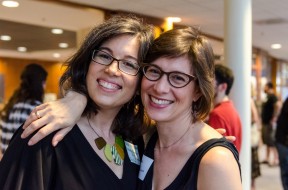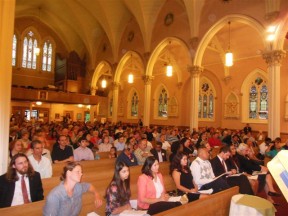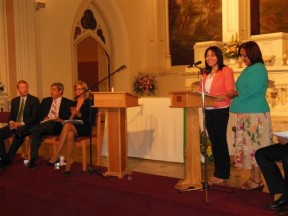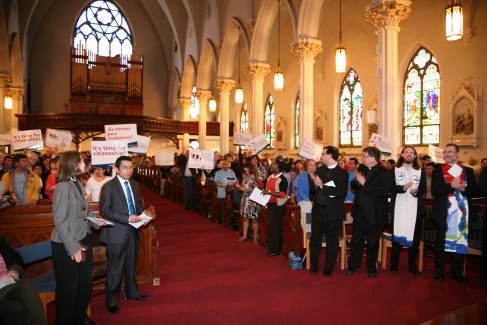After four years of ENORMOUS organizing efforts by JOIN alum, Dan Gelbtuch, the Youth Jobs Coalition, and the collaboration of alumni Chris Messinger, Anna Lifson, Ilana Lerman, Dylan Lazerow, and others, 19 million dollars of MA state funding are secured for youth jobs!!! For the first time since the recession, youth jobs will be forward funded, meaning that 9 of those $19 million will be set aside for summer jobs for the summer of 2014! Read more in the Boston Globe: This article was written by Dan Gelbtuch and JOIN partner, Lew Finfer.
An Alternative Graduation Speech: Karla Van Praag’s Siyyum Remarks
These remarks were delivered by JOIN for Justice Executive Director, Karla Van Praag, at the 15th Annual Siyyum/Graduation on June 24th, 2013.

In this past week’s New Yorker, Malcolm Gladwell tells the story of economist Albert O. Hirschman who embraced uncertainty and failure for its essential role in progress. He wrote, for example, of a tunnel constructed through the Hoosac Mountain in Western Massachusetts in the 1800’s that would never had been built had engineers correctly projected how difficult it would be to penetrate. Yet after it’s completion, this railway played a pivotal role in the developing economy of Massachusetts. This example, but one of many, he held the theory that our failures are often the precursors to our successes. Therefore we should not shy from doubt inherent in our aspirations, but welcome it.
When reading this article, I found myself reminded of one of the maxims we teach our Fellows, and indeed anyone who aspires to become an organizer. Embrace failure, we say. You are going to have a lot of it. Indeed, one of our partner organization’s teaches, if you are not failing at least 30% of the time, you are not pushing yourself hard enough.
We’ve all been to graduations where speaker after speaker tells stories of success, happy tales where they were magnificent and everything worked out right. Listening to those tales sometimes engenders a sense of isolation and skepticism in the listener – you know that’s not how your life works, and you feel more alone.
Not here. At JOIN, we are ready to embrace our leaders’ and our own mistakes. We willingly embrace struggle. We embrace failure. Because our failures are real, but, if we cultivate the charred earth with determination, strategy, and creativity, the seeds of recovery will begin to grow out of that ground. Seeds that may never have sprouted it we played it safe. Tonight our fellows will be bold enough to share stories of breaking up, stories of failure, stories of our ideas being challenged, and also the honest happy tales of how they came out the other side and succeeded beyond their expectations.
If JOIN promoted ourselves to our partner organizations and to our foundations with the slogan “We love failure”, I’m not sure you all would be sitting here. But, here, when we have brought our community together, we can be clear on what a role it plays in our work. Because, if you are going to enter the space of attempting public leadership, you had better get comfortable with failure real fast. There is nothing more uncertain than efforts to solve social problems. You can’t predict most of what is going to happen. You do know that there is a complex sea of competing interests keeping things the way they are. When you decide to lead, you are, as Marshall Ganz teaches, accepting responsibility for enabling others to achieve shared purpose, in the face of uncertainty. This very decision takes courage to act – you don’t know what the outcome will be. This courage is a precursor to leadership. These are some brave people in front of you, as you’ll see soon enough. They are courageous enough to lead, as they’ve shown us this year and will show us in the years ahead.
We teach organizing to provide the frameworks and tools to navigate this uncertainty. Because there is so much uncertainty, because failure is always a possibility, because the stakes are so high, it’s important to learn how to lead, how to knit people together, how to strategize, how to take action. Unless you know how to react strategically and creatively, the failure is the final chapter, not a new beginning.
Yet, (sorry to break it to you,) knowing organizing is not a magic pill. The context of the situation always towers over the theory for how to approach it. The mountain is denser than we thought. The public official renegs on their deal. The people who obviously were going to follow through… don’t. When context doesn’t line up with our theory, then what do we do? How do we gain the experience to continually react to the unknown? This is what makes the JOIN experience so valuable to have in the beginning of one’s efforts to lead. For 15 years, the JOIN Fellowship model has been apprenticeships with Jewish and secular social change organizations combined with training, with mentors, with educators and with a supportive Jewish community. It is this smaller and larger community which enables these emerging leaders – that we selected from among the many that applied to be part of this experience for their very propensity to succeed – to ultimately succeed. Because they lift each other up after they fall, they share their own learning about how to approach change, and they keep each other courageous when it gets hard. JOIN may have planted the seeds, but it is the community they build together which has enabled so many people to have such an impact on countless organizations in Boston and beyond. This night is just the beginning. These peers among you, as you already know, are the teachers of your future.
I learned recently that when you are trying to build muscle mass, your body experiences it as tiny little tears. Each time you put stress on your muscles, they break a little. But your body responds in two ways – it not only repairs the broken cells but replaces the dead muscle cells with more cells. It prepares you to cope with similar situations in the future. Our body gets stronger with every failed cell. Without the failure, we remain weak.
So as you hear our outstanding fellows’ stories tonight of breaking up, whether they be muscles or friendships or efforts at change, remember failure’s necessary role before the to break through. Despite our hopes at avoiding failures, it’s inevitability may be the very reason we succeed. We are getting stronger with every fallen step.
ECCO fights for raising the minimum wage
Led by JOIN alum and Essex County Community Organization Director, Dan Lesser, ECCO had a multi-issue Action assembly on Immigration Reform, Raising the minimum wage and Criminal justice reform in early June 2013.
Over 400 people came out on a rainy night. There was strong spirit and testimonies, and a real sense of all the different congregations in the fight together. This action was laying the ground work for a major statewide campaign this fall around raising the minimum wage.
The Essex County Community Organization (ECCO) — a Lynn-based group of congregations that aims to help communities in areas such as job training, health care, youth development, housing, and safety — hosted the event. Click here to read more.

Photo credit Dan Lesser

Photo credit Dan Lesser
Justice at JOIN – Fellows Negotiate New Stipend Minimum
From Jennie Msall
Current Organizing Fellow and Youth/Family Organizer at St Stephen’s Episcopal Parish Youth Programs
Beginning this fall, partner organizations are being asked to hire JOIN Fellows at a salary range of $28,000-$35,000, and to provide health benefits commensurate with other full time employees. This change from a minimum salary of $24,000 came out of conversations between current fellows about justice within JOIN.
This past year, I’ve frequently scheduled lunch dates with my co-fellows Sarah and Davida, who work within walking distance of my placement organization. During one lunch, Davida had just come from a meeting at Crittenton Women’s Union, where she had learned about their report that measures “how much income various family types across the Commonwealth require to meet their most basic expenses- housing, utilities, food, basic transportation, child care, health care, clothing, essential personal and household items, and taxes—without public or private assistance” (2). The report explains that a single adult living in Boston should be making at least $28,717 in order to meet basic living expenses in Massachusetts.
After Davida shared that number, our conversation turned to the fellowship’s current minimum salary of $24,000. Many of us had previously expressed that this was a low amount to make while meeting student loan payments and other living expenses, and that the JOIN salary was a potential barrier for candidates to apply to or participate in the fellowship. With our concerns confirmed by the Crittenton Women’s Union, we decided to talk to Karla Van Praag, Executive Director of JOIN.
Davida and I met with Karla on a February morning, wanting to learn more about how the minimum salary had been determined, and if there was any openness from JOIN to set a higher minimum for partner organizations. We learned that Karla had last increased the minimum salary four years prior, in a prior effort to remain consistent with the founding vision of the organization in 1998, which focused on nourishing (and paying for) the social justice organizer, rather than underpaying them and burning them out. Nevertheless, she said, setting the minimum salary is a balancing act, where JOIN wants to maximize benefit for the fellows, while also providing a financial incentive for organizations to hire JOIN fellows.
After talking through the report findings with Karla, she agreed to look into raising it, and asked us to help with some research about how an increase would impact placement organizations. Over the next few days, we designed and sent out a survey to past and present partner organizations, explaining that we were considering raising the minimum salary. We wanted to know how the cost of participating in JOIN compares to hiring a full-time staff member for a similar role, if the organization’s ability to participate in JOIN is strongly connected to the minimum salary, and if a salary increase would impact the organization’s interest in and ability to host a fellow.
While many of the organizations responded to the survey saying that they agreed with the reasoning behind increasing the minimum salary, some were concerned that an increase would affect their ability to host a JOIN fellow. JOIN’s leadership decided that the plusses of changing the base salary outweighed the minuses, and decided to proceed. JOIN remains committed to working with each of our partners to make sure they can continue to host fellows, despite the higher salary, and can offer support through creative fundraising opportunities and small salary stipends.
In addition to advocating for the change within JOIN, my fellow Fellows and I have spent parts of our JOIN sessions discussing common self-care issues in the organizing world, like being overworked and underpaid, and sharing tools for negotiating salary and benefits. I am grateful to be part of a fellowship that was founded with the belief that social justice professionals shouldn’t get “used up” and should be treated fairly and with respect. And I am grateful to work with other fellows who understand the importance of making social justice work emotionally and financially sustainable, so that those same workers have the ability, energy and desire to continue to fight for social justice in the world.







